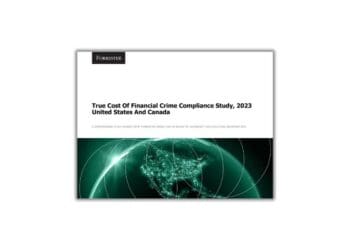The speed and haste by which El Salvador adopted Bitcoin as legal tender has opened the door for significant risk and KYC challenges. While the volume of crypto exchanges continues to snowball, the lack of appropriate AML regulation leaves businesses across sectors exposed.
El Salvador’s ‘crypto-bro’ president, 40-year-old Nayib Bukele, has made Bitcoin (BTC) the central plank of his economic agenda. The populist leader has ruled the Central American country since 2019, racking up a litany of accusations from democratic backsliding to rampant corruption. But it’s his flirtation with cryptocurrency that has hit headlines. Not only did he force through world-first reforms making Bitcoin legal tender in a midnight session of Congress, but he plans to build a geo-thermal powered city devoted to Bitcoin mining at the base of a volcano.
This new city, the president said, will have no income tax and “have everything. Residential areas, commercial areas, services, museums, entertainment, bars, restaurants, airport, port, rail – everything devoted to Bitcoin.”
Meanwhile, the government has given away a new digital wallet app, Chivo, to each citizen, containing $30 worth of Bitcoin and installed hundreds of crypto cash machines across the country. Given the rapid fluctuations in Bitcoins’ value, no one knows quite how much the new city will cost to build, but El Salvador’s legalization of Bitcoin as tender has shifted from an interesting thought experiment to a potential AML compliance crisis.
Moving Fast and Breaking AML/KYC Protocols
The FATF – the world’s money laundering and terrorist financing watchdog – could end up grey listing El Salvador due to the cryptocurrency reforms. Cato Institute (a right-leaning think tank founded by Charles Koch) economist Steve Hanke, a former Reagan administration official and proponent of the dollarization of Latin American economies, has identified at least 27 red flag behaviors regarding virtual-asset transactions that could impact the Salvadoran economy.
Editors Note: A rundown of Hanke’s and President Bukele’s disagreements with each other can be found via their correspondence on Twitter.
Ok, ID-10t, I’m going to school you again, not because it’s going to be of use for you, since you’re just getting paid to attack #Bitcoin and defend fiat, but because the people deserve to know you are a fraud. https://t.co/BbDGGnyjuu
— Nayib Bukele 🇸🇻 (@nayibbukele) January 8, 2022
Making the tokens legal currency means everyday businesses may find it exceedingly difficult to undertake necessary KYC requirements expected of Bitcoin transactions. Bukele’s hasty measures have made it far easier for criminals who have Bitcoins to exchange them for hard currency, or potentially launder tokens through luxury goods or real estate. Identifying deliberately structured transactions becomes exponentially more difficult when the currency can have double- or triple-digit value fluctuations against the dollar, sometimes daily.
Making sense of customer profiles could present a significant challenge too. Around 70% of El Salvador is unbanked, offering virgin territory for money launderers to open new accounts with wallets bursting with BTC. A rural farmer with millions in Bitcoin to their name is a textbook case for enhanced due diligence or increased monitoring anywhere else in the world. In El Salvador that farmer can currently fly under the radar.
One of the benefits of Bitcoin is that transactions are stored on blockchain, theoretically making every payment trackable and traceable. But the Chivo wallet, made available to every Salvadoran, has been plagued with problems from identity theft to disappearing coins. It’s a worrying start for a national crypto experiment where trust in the technology is the gold standard.
The use of cryptocurrency itself is not theoretically more prone to money laundering than paper currency. The issue in El Salvador lies in the lack of sufficient AML and KYC regulations. In their assessment of El Salvador’s Bitcoin roll out, Fitch has not yet downgraded their rating of the country’s banks. But the credit appraiser stated: “If technological infrastructure, controls, and the regulatory and supervisory framework are not adequately developed or implemented, it could expose banks to greater operational, cyber, and money laundering risks.”
Failures and Successes in Monitoring LATAM Crypto Transactions
Other countries in the region have been more successful with the switch to digital. In Colombia, the online banking space grew by 60% in 2020, with more than 1.6 million Colombians downloading and activating a digital wallet for the first time last year. Younger generations are the most enthusiastic adopters. Despite rapid growth and popularity, the industry in Colombia is well-regulated. Each wallet provider must be certified to meet the payment card industry (PCI) compliance standards. Traditional banks have also entered the space, offering customers a more reliable and trusted name.
Where Colombia leads, other Latin American countries are following. Across the region, cash payments accounted for around 80% of transactions in 2018. By the end of 2020, this had nosedived to little more than a quarter. With the growing popularity of digital payments across Latin America not attracting the same concerns as developments in El Salvador, some countries are clearly managing money laundering compliance in the digital age much better than others.
What This Means for International Business
The adoption of Bitcoin in El Salvador threatens to exacerbate money laundering concerns unless a regulatory framework is effectively implemented. With phishing scams and online frauds the world over demanding ransom in Bitcoin, efforts to require KYC procedures for crypto exchanges through stricter regulations like the EU’s 6th Directive could be rendered useless by a Central American haven.
As Fitch has noted, Salvadoran banks have yet to meet Basel II or Basel III standards. The country does not follow IFRS accounting standards and doesn’t have capital requirements for market or operational risk. For correspondent banking services and regulated entities the world over, when presented with a transfer from El Salvador and the source of funds listed simply as BTC, what kind of money laundering risk does that present? Is a very high dollar amount in an average citizen’s bank account simply the result of a Bitcoin induced economic boom, or the illicit proceeds of corrupt gains?
President Bukele’s moves to promote the controversial adoption of Bitcoin come amidst increasing concerns about democratic backsliding and corruption in the country. The US has recently banned dozens of Salvadoran officials from the United States for corruption, several of whom are senior members of President Bukele’s administration. A number have also been indicted for money laundering and accepting bribes.
President Bukele shows no sign of stepping back from his controversial reforms. The self-proclaimed ‘World’s Coolest Dictator’ has previously used the military to force legislation through congress and has ousted five supreme court judges and an attorney general who ruled against him. President Bukele’s penchant for ‘rule-by-tweet’ and his popularity in cryptocurrency circles is raising serious red flags. FATF action against El Salvador could have serious consequences. Grey listing flags the country for increased monitoring, and is the first step towards black listing. If black listed, El Salvador would join only Iran and North Korea. The international community would be obliged to sanction El Salvador and automatically apply enhanced due diligence.
The trouble with President Bukele is he may be more interested in winning fans among cryptocurrency advocates than assuaging the international community’s concerns. He’s promised to make ‘surprise announcements’ at upcoming Bitcoin summits, and started the new year predicting that Bitcoin will reach $100,000 in value in 2022. Crypto fans may be watching El Salvador’s experiment closely, but so are criminals.











